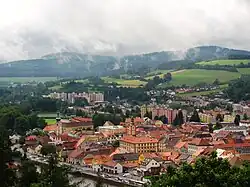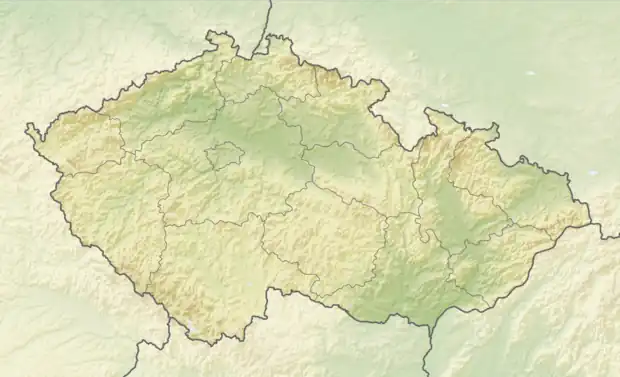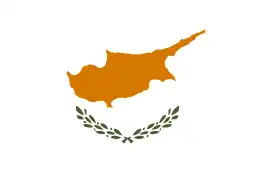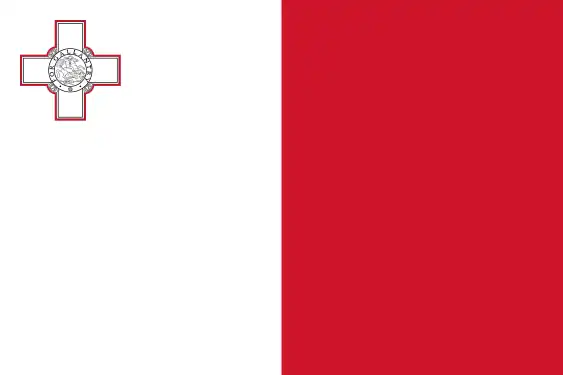Sušice | |
|---|---|
 General view | |
 Coat of arms | |
 Sušice Location in the Czech Republic | |
| Coordinates: 49°13′52″N 13°31′13″E / 49.23111°N 13.52028°E | |
| Country | |
| Region | Plzeň |
| District | Klatovy |
| First mentioned | 1233 |
| Government | |
| • Mayor | Petr Mottl (ODS) |
| Area | |
| • Total | 45.65 km2 (17.63 sq mi) |
| Elevation | 472 m (1,549 ft) |
| Population (2023-01-01)[1] | |
| • Total | 10,820 |
| • Density | 240/km2 (610/sq mi) |
| Time zone | UTC+1 (CET) |
| • Summer (DST) | UTC+2 (CEST) |
| Postal code | 342 01 |
| Website | www |
Sušice (Czech pronunciation: [ˈsuʃɪtsɛ]; German: Schüttenhofen) is a town in Klatovy District in the Plzeň Region of the Czech Republic. It has about 11,000 inhabitants. The historic town centre is well preserved and is protected by law as an urban monument zone.
Administrative parts
Sušice is made up of 17 town parts and villages: Sušice I–III, Albrechtice, Červené Dvorce, Chmelná, Divišov, Dolní Staňkov, Humpolec, Milčice, Nuzerov, Páteček, Rok, Stráž, Volšovy, Vrabcov and Záluží.
Etymology
The name Sušice is derived from the Czech verb sušit, i.e., "dry". At the time of its establishment, it was a place where gold panners dried gold sand after washing it.[2]
Geography
Sušice is located about 24 km (15 mi) southeast of Klatovy and 56 km (35 mi) south of Plzeň. It lies in the Bohemian Forest Foothills. The highest point is the hill Sedlo at 902 m (2,959 ft) above sea level. The Otava River flows through the town.
Climate
Average daily temperature in July is about 17.1 °C (62.8 °F), while January mean temperatures are typically −2.4 °C (27.7 °F). The annual average is 7.5 °C (45.5 °F).
| Climate data for Sušice | |||||||||||||
|---|---|---|---|---|---|---|---|---|---|---|---|---|---|
| Month | Jan | Feb | Mar | Apr | May | Jun | Jul | Aug | Sep | Oct | Nov | Dec | Year |
| Mean daily maximum °C (°F) | 0.5 (32.9) |
2.1 (35.8) |
6.5 (43.7) |
12.3 (54.1) |
16.4 (61.5) |
19.7 (67.5) |
21.3 (70.3) |
21.3 (70.3) |
16.7 (62.1) |
12.0 (53.6) |
6.2 (43.2) |
1.9 (35.4) |
12.1 (53.8) |
| Daily mean °C (°F) | −2.4 (27.7) |
−1.5 (29.3) |
2.2 (36.0) |
7.5 (45.5) |
12.0 (53.6) |
15.5 (59.9) |
17.1 (62.8) |
17.0 (62.6) |
12.6 (54.7) |
8.1 (46.6) |
3.0 (37.4) |
−0.8 (30.6) |
7.5 (45.5) |
| Mean daily minimum °C (°F) | −5.2 (22.6) |
−4.9 (23.2) |
−1.8 (28.8) |
2.4 (36.3) |
7.2 (45.0) |
10.9 (51.6) |
12.6 (54.7) |
12.5 (54.5) |
8.6 (47.5) |
4.6 (40.3) |
0.1 (32.2) |
−3.3 (26.1) |
2.9 (37.2) |
| Average precipitation mm (inches) | 68 (2.7) |
56 (2.2) |
73 (2.9) |
68 (2.7) |
101 (4.0) |
113 (4.4) |
118 (4.6) |
106 (4.2) |
79 (3.1) |
65 (2.6) |
64 (2.5) |
69 (2.7) |
980 (38.6) |
| Source: Climate-Data.org[3] | |||||||||||||
History
Sušice originated as a settlement near the Otava River, a gold-mining area. The settlement was probably founded around 790, however the first written mention is from 1233. In the 12th century, the area was owned by the Bavarian Counts of Bogen. It was re-connected to Bohemia by King Ottokar II in the 13th century and after 1260 it became a royal fortified town.[4]
During the Hussite Wars (1419–1434), Sušice was a Hussite town. The town's major economic growth occurred in the 16th century, when the town profited from the salt, grain and malt trade with neighbouring Bavaria. In the 17th and 18th centuries, Sušice suffered from wars, fires and the Counter-Reformation. The most devastating was the fire of 1707, which destroyed most of the town. In the 19th century, new prosperity came. The production of phosphorus matches started here and made Sušice famous all over the world. The leather industry also developed in the town, and at the end of the 19th century, the mining and processing of limestone was started.[4]
Until 1918, Sušice – Schüttenhoffen was part of the Austrian monarchy (Austrian side after the compromise of 1867). The town was an administrative seat of the district of the same name, one of the 94 Bezirkshauptmannschaften in Bohemia.[5]
Jewish community
The first written mention of Jews in Sušice is from 1562. The number of Jews in Sušice gradually increased and reached its peak in 1860, when 300 lived here. A pogrom occurred in 1866, then the population decreased and in 1930 only 112 Jews lived in Sušice. They had a reserved part of the town for living, which was accessible only from the town walls (today's Vodní, formerly Židovská (i.e. "Jewish") street).[6]
Three synagogues were located in Sušice. The first was a wooden prayer house, which burned down in 1707. A new synagogue was built on its site, which served until 1923, when it also burned down. A third synagogue was in operation from 1859, which served its purpose until the World War II. After the war, it became the property of the town and was demolished in 1963.[6]
The old Jewish cemetery was established in 1626, the last burial took place there in 1873. After its capacity was no longer sufficient, a new cemetery was founded in 1873, where the last burial took place in 1946.[6]
Demographics
|
|
| ||||||||||||||||||||||||||||||||||||||||||||||||||||||
| Source: Censuses[7][8] | ||||||||||||||||||||||||||||||||||||||||||||||||||||||||
Economy

Sušice was known for the production of matches, under the SOLO brand. The factory was founded by Vojtěch Scheinost in 1839, and production was financed by entrepreneur Bernard Fürth.[9] The industry continued until 2008, when it ended due to financial problems. Production was then moved to India, and the enterprise was transformed into a trading company dealing in related goods (matches, lighters, etc.).[10]
Transport
Sušice is located on the regional railway line heading from Klatovy to Horažďovice.[11]
Sights
_(2).jpg.webp)

The landmark of the town square is the Renaissance town hall with a 31 metres (102 ft) high tower. The Bohemian Forest Museum is located in a Gothic house on the corner of the square. It focuses on the history of Sušice and the local production of matches. The museum also exhibits the largest match in the world, measuring 3.6 m (12 ft).[12]
The Church of Saint Wenceslaus was built in the mid-14th century. Its southern wall was formed by the town wall. During the fire in 1707, the church was damaged and lost its two towers. It was reconstructed in the Baroque style and a new small tower was built. In 1884–1885, pseudo-Gothic modifications were made.[13]
The Capuchin monastery with the Church of Saint Felix of Cantalice was founded by Emperor Ferdinand III. The church was built in 1651–1655 and the monastery building was constructed in 1665–1686. It used to be an important pilgrimage site. With the exception of the years 1950–1992, the monastery still serves the Capuchins.[13]
The Church of the Assumption of the Virgin Mary is probably part of a larger unfinished Gothic church from the 14th century. The cemetery church was rebuilt to its current form after the fire in 1591.[13]
The Chapel of the Guardian Angel on Stráž hill on the outskirts of Sušice is a significant landmark of the town. It was built in the early Baroque style in 1682–1683.[14] It is a pilgrimage site and the way to it is lined with the Stations of the Cross.[13]
The Jewish community is commemorated by two Jewish cemeteries. The Old Cemetery is one of the oldest Jewish cemeteries in Bohemia. The oldest preserved tombstone dates from 1708.[13]
Svatobor is a hill with an altitude of 845 m (2,772 ft), known for the eponymous observation tower. The hill was a sacred place for the original Slavic tribes and a burial ground was discovered at its foot. The stone observation tower was built in 1934, after the original tower from 1900 burned down. It is 31.6 m (104 ft) high.[15]
Notable people
- Maximilian Pirner (1853–1924), painter
- Karl Koller (1857–1944), Austrian ophthalmologist
- František Salzer (1902–1974), theatre director and actor
- Břetislav Pojar (1923–2012), puppeteer, animator and film director
- Petr Vaníček (born 1935), Czech-Canadian geodesist
- Marie Fikáčková (1936–1961), serial killer
- Jiří Maštálka (born 1956), politician
- Tomáš Pekhart (born 1989), footballer
Twin towns – sister cities
Sušice is a member of the Douzelage, a town twinning association of towns across the European Union. This active town twinning began in 1991, and there are now regular events resulting from this membership, such as festivals, or a produce market presenting goods from the countries of the twin towns. Its members are:[16]
 Agros, Cyprus
Agros, Cyprus Altea, Spain
Altea, Spain Asikkala, Finland
Asikkala, Finland Bad Kötzting, Germany
Bad Kötzting, Germany Bellagio, Italy
Bellagio, Italy Bundoran, Ireland
Bundoran, Ireland Chojna, Poland
Chojna, Poland Granville, France
Granville, France Holstebro, Denmark
Holstebro, Denmark.svg.png.webp) Houffalize, Belgium
Houffalize, Belgium Judenburg, Austria
Judenburg, Austria Kőszeg, Hungary
Kőszeg, Hungary Marsaskala, Malta
Marsaskala, Malta Meerssen, Netherlands
Meerssen, Netherlands Niederanven, Luxembourg
Niederanven, Luxembourg Oxelösund, Sweden
Oxelösund, Sweden Preveza, Greece
Preveza, Greece Rokiškis, Lithuania
Rokiškis, Lithuania Rovinj, Croatia
Rovinj, Croatia Sesimbra, Portugal
Sesimbra, Portugal Sherborne, England, United Kingdom
Sherborne, England, United Kingdom Sigulda, Latvia
Sigulda, Latvia Siret, Romania
Siret, Romania Škofja Loka, Slovenia
Škofja Loka, Slovenia Tryavna, Bulgaria
Tryavna, Bulgaria Türi, Estonia
Türi, Estonia Zvolen, Slovakia
Zvolen, Slovakia
Sušice also has two other twin towns:[17]
.svg.png.webp) Uetendorf, Switzerland
Uetendorf, Switzerland Wenzenbach, Germany
Wenzenbach, Germany
Gallery
 The southern end of Svobody Square
The southern end of Svobody Square%252C_n%C3%A1m_Svobody_%C4%8Dp._40%252C_Muzeum_%C5%A0umavy%252C_Voprchovsk%C3%BD_d%C5%AFm.JPG.webp) The Bohemian Forest Museum
The Bohemian Forest Museum.jpg.webp) Fragment of the town walls
Fragment of the town walls.jpg.webp) Church of Saint Wenceslaus
Church of Saint Wenceslaus Church of the Assumption of the Virgin Mary
Church of the Assumption of the Virgin Mary.jpg.webp) Dlouhoveská street
Dlouhoveská street.jpg.webp) Gymnasium
Gymnasium Primary school
Primary school
References
- ↑ "Population of Municipalities – 1 January 2023". Czech Statistical Office. 23 May 2023.
- ↑ "Názvy západočeských měst a městeček" (in Czech). Czech Radio. 7 May 2004. Retrieved 12 December 2022.
- ↑ "Sušice Climate". Climate-Data.org. Retrieved 12 December 2022.
- 1 2 "Historie Sušice" (in Czech). Město Sušice. Retrieved 12 December 2022.
- ↑ Die postalischen Abstempelungen auf den österreichischen Postwertzeichen-Ausgaben 1867, 1883 und 1890, Wilhelm Klein, 1967
- 1 2 3 "Židovské hřbitovy střední Šumavy – Stručné dějiny židů v Sušici" (in Czech). Město Sušice. Retrieved 12 December 2022.
- ↑ "Historický lexikon obcí České republiky 1869–2011 – Okres Klatovy" (in Czech). Czech Statistical Office. 21 December 2015. pp. 27–28.
- ↑ "Population Census 2021: Population by sex". Public Database. Czech Statistical Office. 27 March 2021.
- ↑ "Příběh značky" (in Czech). SOLO MATCHES & FLAMES, a.s. Retrieved 27 December 2020.
- ↑ "Solo Sušice končí s výrobou zápalek, přesune ji do Indie" (in Czech). Novinky.cz. 31 December 2008. Retrieved 27 December 2020.
- ↑ "Detail stanice Sušice" (in Czech). České dráhy. Retrieved 5 July 2023.
- ↑ "Sušice" (in Czech). CzechTourism. Retrieved 12 December 2022.
- 1 2 3 4 5 "Církevní památky" (in Czech). Město Sušice. Retrieved 12 December 2022.
- ↑ "Poutní kaple Anděla Strážce" (in Czech). National Heritage Institute. Retrieved 12 December 2022.
- ↑ "Rozhledna Svatobor u Sušice – posvátné místo Slovanů" (in Czech). CzechTourism. Retrieved 12 December 2022.
- ↑ "Member towns". Douzelage. Retrieved 12 December 2022.
- ↑ "Partnerská města" (in Czech). Město Sušice. Retrieved 12 December 2022.